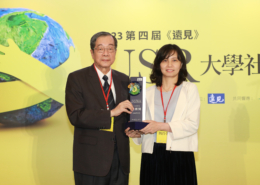High-tech proof for a home remedy: Tea blocks vital cancer pathway
TMU’s Yuan-Soon Ho finds a cup’s worth daily protects smokers and passive smokers from four major nicotine-linked cancers
 Distinguished Professor Yuan-Soon Ho, who directs Taipei Medical University’s Graduate Institute of Medical Sciences, recently detected a mechanism by which tea can block the development of “foam cells” linked to both nicotine and cancers.
Distinguished Professor Yuan-Soon Ho, who directs Taipei Medical University’s Graduate Institute of Medical Sciences, recently detected a mechanism by which tea can block the development of “foam cells” linked to both nicotine and cancers.
“We found dramatic results, with alpha-9 downregulated significantly after two months,” said Prof. Ho. “Cellular damage cannot be reversed, but we can slow the destructive processes this way.”
This was big news in the global medical community, and both television and international health bloggers took note with stories and interviews. After all, with no expectation of profit, Prof. Ho may have changed the world by highlighting the protective effects of something already found in most homes.
Does it matter which kind of tea? Not a bit, Prof. Ho says, although he chose to conduct his most noted research with Pu Erh, an earthy dark tea that is revered like a fine wine and sometimes aged for generations. Prof. Ho chose it because he likes it – but he suspects that the slight fermentation of this variety also helps to neutralize any environmental toxins that the leaves may carry.
While nicotine is a quite natural tobacco ingredient that smokers crave, it is linked to cancer-spawning “foam cells” in smokers and passive smokers who breathe fumes. The good news is that long-term tea consumption helps monocytes resist the upregulation nicotine causes that result in such cells.
And this “long-term consumption” was only two months. The study took 200 subjects, drew baseline blood samples, and assigned 100 to take capsules of tea powder daily, while the other 100 served as control. After one and two months, blood was drawn and analyzed for this monocyte upregulation and foam-cell formation – but even lower doses blocked these responses in the test group.
While powdered tea leaves were used in capsules to standardize the research (and were irradiated to eliminate any issues of contamination with other organisms), Prof. Ho said a daily teabag’s brew is a comparable dosage as well.
He encouraged tea drinkers to avoid teas raised with pesticides, but said these pesticides would not affect the protective pathway: even the cheapest supermarket tea protects against this “alpha-nine” (a9-nAchR) reaction to nicotine.
This research was supported by Taiwan’s Ministry of Science and Technology, which helps many TMU laboratories lead the nation’s private universities in international rankings. Yet the team is small, with three clinical medical doctors, one Ph.D. researcher, four Ph.D. students, two master’s degree students and an assistant besides Prof. Ho.
Seven teas were tested for six components, but all were found equally useful. This information was particularly useful for passive smokers, who can suffer mutations at only 8 nanomona-10 micromona exposures. Such exposures are linked to breast, lung, bladder and colorectal cancer, as noted by the Emerald Planet international wellness blog and local TV reports.
Prof. Ho said the Institutional Review Board’s ethical standard called for the research to focus on the safest dose with a reasonable effect, which turned out to be just half a gram three times daily. (His results can be found in a recent review article in the influential journal Clinical Cancer Research. http://www.ncbi.nlm.nih.gov/pubmed/21444681,).
So enjoy your cup of tea with the knowledge that it is protecting you from deadly mutations – and consider joining the leading edge of medical research at Taipei Medical University.
-
Lee CH, Huang CS, Chen CS, et al. Overexpression and activation of the alpha9-nicotinic receptor during tumorigenesis in human breast epithelial cells. Journal of the National Cancer Institute. Sep 8 2010;102(17):1322-1335. http://www.ncbi.nlm.nih.gov/pubmed/20733118
-
Tu SH, Ku CY, Ho CT, et al. Tea polyphenol (-)-epigallocatechin-3-gallate inhibits nicotine- and estrogen-induced alpha9-nicotinic acetylcholine receptor upregulation in human breast cancer cells. Molecular nutrition & food research. Mar 2011;55(3):455-466. http://www.ncbi.nlm.nih.gov/pubmed/21370452
-
Tu SH, Chen MY, Chen LC, et al. Pu-erh Tea Extract Attenuates Nicotine-Induced Foam Cell Formation in Primary Cultured Monocytes: An in Vitro Mechanistic Study. Journal of agricultural and food chemistry. Apr 27 2016;64(16):3186-3195. http://www.ncbi.nlm.nih.gov/pubmed/27001463
-
Li-Ching Chen M-YC, Shih-Hsin Tu, Min-Hsiung Pan, Chih-Yu, Lo, Chi-Tang Ho, Chih-Hsiung Wu, and Yuan-Soon Ho. Pu-erh tea attenuate smoking-induced foam cell formation through inhibition of the a9-nicotinic-acetylcholine receptor expression in monocytes: an ex vivo study. . J Functional Foods. 2016;22:132-144. (http://www.sciencedirect.com/science/article/pii/S1756464616000244)
-
This article is simultaneously available on QS WOWNews.
-
For interviews or a copy of the paper, contact Office of Global Engagement via global.initiatives@tmu.edu.tw.





期許永續發展成為醫療產業新契機。-260x185.jpg)










